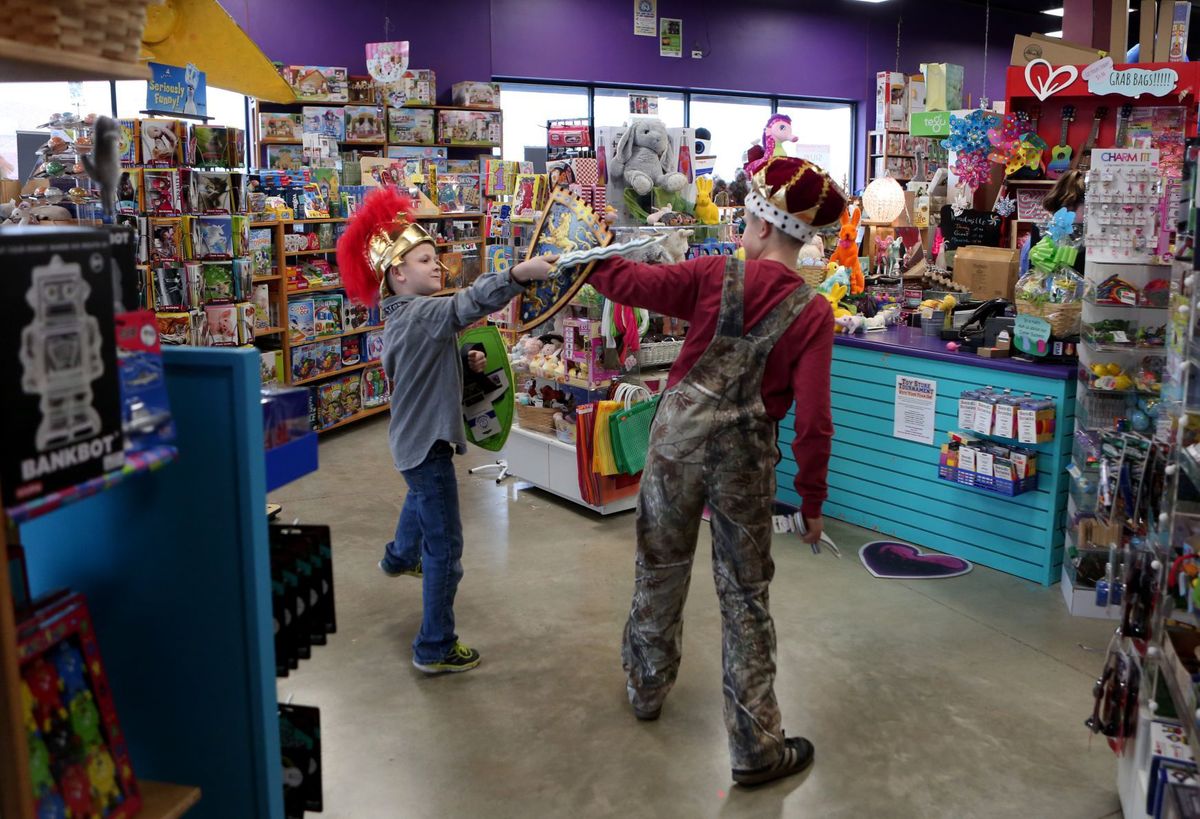
More than $7 billion in toy sales will be reallocated throughout the industry after Toys R Us finalizes its liquidation sale and closes 700-plus stores, including several in the St. Louis area.
Local toy retailers and specialty shops are hoping some of that money trickles into their cash registers.
“There is definitely an opportunity for us,” said Shawnta’ Ray, owner of Happy Up Inc., which has two toy stores in the region in Clayton and Edwardsville. “Something we need people to understand is there isn’t just one real toy store in the area. There are thousands of independent toy stores across the country, and there are four or five of us in St. Louis.”
According to a survey from Coresight Research, a New York-based research firm that focuses on the retail industry, nearly 14 percent of Toys R Us shoppers have also browsed for products at independent toy stores in the last 12 months, suggesting those consumers could end up shopping there moving forward.
Just more than 11 percent of the broader toy-buying public said they browsed for toys or games at independent toy shops, with 10.4 percent actually buying products from those stores over the last 12 months.
“The hope is that it’s advantageous for us,” said Tom Berry, who along with his wife, Kristin, own the Frisco Train Store in Valley Park, which specializes in toy train sets, tracks and accessories.
Local retailers, however, will have to wait out Toys R Us’ liquidation sale, which could last through June and provide shoppers with more than three months of enticing sales. Toys R Us also operates Babies R Us, which is shuttering after liquidation sales.
“Liquidations don’t help, so we might be in for a bit of a crunch in the short term,” Ray said. “But long-term, it should push a flood of people looking where to go for a toy store.”
Idanna Smith, president of The Good Toy Group, a cooperative of independent toy stores nationwide of which Happy Up is a member, said more stores were likely to go on the marketing offensive to attract more customers.
“There is an opportunity, and for any small business, when opportunity presents itself, you have to figure out how to get your share,” she said. “We’re all trying to figure out what the best ways to speak to consumers are.”
Smith said that instead of marketing to people within a certain radius relative to their store, perhaps toy store owners should “look at where the nearest Toys R Us is to them and a little bit further” than they typically do.
Ray said she planned to be more aggressive with marketing campaigns, might start introducing new products and would increase the number of events aimed at bringing children and their parents through the door. Once shoppers walk in, Ray said, they usually enjoy their experience and return.
“Because we’re relatively small, we have the ability to quickly adapt to what our customers need, and every year our store can be different based on those needs,” she said. “We also offer free gift wrapping and we generally know our customers, so we can better help find toys right for their children.”
While some consumers may spend more money in local shops, a more likely scenario entails many shoppers’ shifting to other retail behemoths such as Walmart, Amazon and Target, which all figure to make major moves to capture Toys R Us’ business.
“Somebody is going to fill that void,” Smith said. “They had a big business. It’s not like they didn’t have the business, they just didn’t execute the business plan very well. So Target will be right there. Walmart will be, too. And I expect Amazon will do everything in their power to fill that void, as well.”
The Coresight research also said dollar stores, department stores, eBay and Costco could also capture some of those toy-buying dollars.
“There are a lot of balls up in the air right now in terms of how the economics of this will shake out,” said Jennifer Labit, founder and CEO of Cotton Babies, a supplier of cloth diapers that also operates a retail store that sells children’s toys and baby gear such as car seats and strollers.
Cotton Babies recently closed its Town and Country retail store and moved it to its headquarters facility in Fenton, where operations could be more streamlined and the company could use an expanded space to offer more classes, group meetings and playdates.
Labit said that Babies R Us, which has two locations in the region, was one of Cotton Babies’ biggest clients and that the closures would result in lost revenue that would have to be made up elsewhere. Cotton Babies is also a supplier for Target and Walmart, among other big box retailers.
The company is also expanding its product offerings to include more hygiene items and adult care products.
“We’ll shift our strategy, and I expect to see more shifts in the future as to where and how people shop,” she said. “When the liquidation sale ends, we’ll move more aggressively to capture that business.”
Cotton Babies’ biggest opportunity is within the registry segment, Labit said.
According to Toys R Us’ last annual report, its Babies R Us Registry business had more than 23 million registrants since being launched a couple decades ago. And a CNBC report said approximately 100,000 active Babies R Us registries could be up for grabs.
“That’s the play to be had for us as registries are growing, and it’s our goal to capture those registries for Cotton Babies,” she said.

